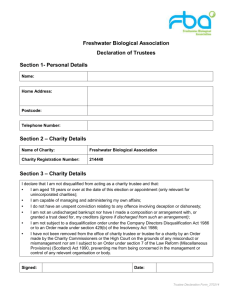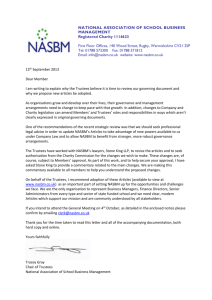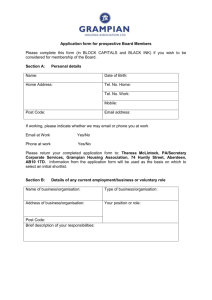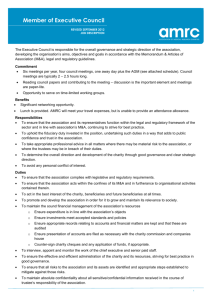9. Disclosure of trustee and staff remuneration, related party and
advertisement
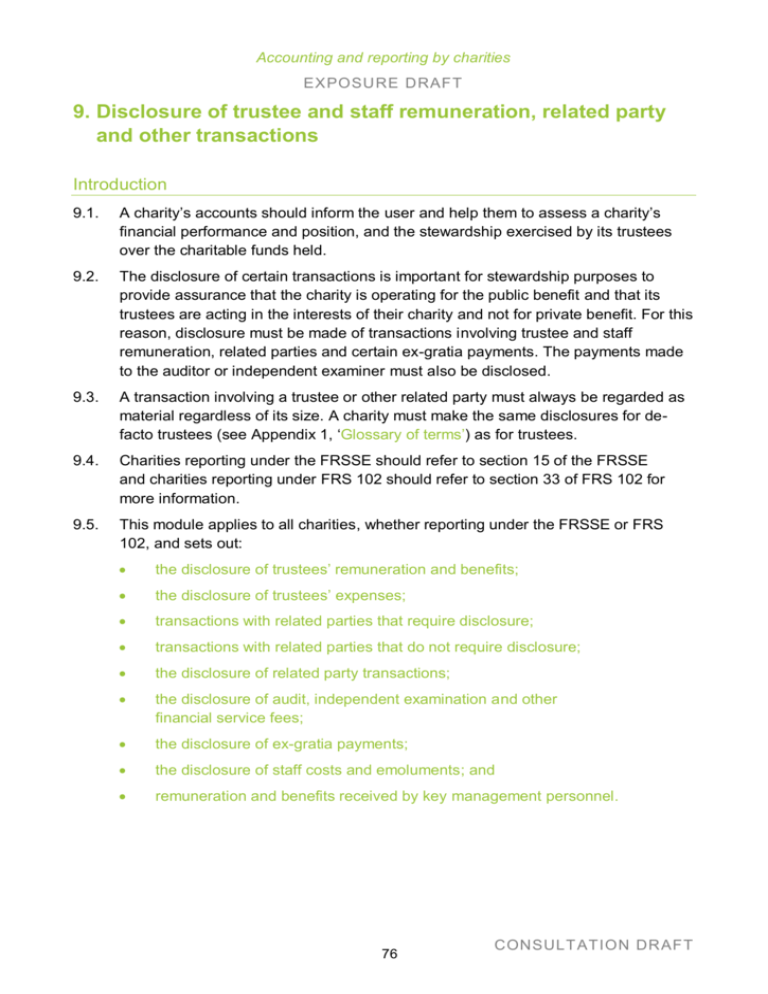
Accounting and reporting by charities EXPOSURE DRAFT 9. Disclosure of trustee and staff remuneration, related party and other transactions Introduction 9.1. A charity’s accounts should inform the user and help them to assess a charity’s financial performance and position, and the stewardship exercised by its trustees over the charitable funds held. 9.2. The disclosure of certain transactions is important for stewardship purposes to provide assurance that the charity is operating for the public benefit and that its trustees are acting in the interests of their charity and not for private benefit. For this reason, disclosure must be made of transactions involving trustee and staff remuneration, related parties and certain ex-gratia payments. The payments made to the auditor or independent examiner must also be disclosed. 9.3. A transaction involving a trustee or other related party must always be regarded as material regardless of its size. A charity must make the same disclosures for defacto trustees (see Appendix 1, ‘Glossary of terms’) as for trustees. 9.4. Charities reporting under the FRSSE should refer to section 15 of the FRSSE and charities reporting under FRS 102 should refer to section 33 of FRS 102 for more information. 9.5. This module applies to all charities, whether reporting under the FRSSE or FRS 102, and sets out: the disclosure of trustees’ remuneration and benefits; the disclosure of trustees’ expenses; transactions with related parties that require disclosure; transactions with related parties that do not require disclosure; the disclosure of related party transactions; the disclosure of audit, independent examination and other financial service fees; the disclosure of ex-gratia payments; the disclosure of staff costs and emoluments; and remuneration and benefits received by key management personnel. 76 CONSULT ATION DRAFT Accounting and reporting by charities EXPOSURE DRAFT Disclosure of trustees’ remuneration and benefits 9.6. Most trustees are volunteers who give their time and expertise without charge. However, provided the arrangement is legally authorised, a trustee may be remunerated for their role as a trustee. On occasions, a trustee may also be employed in some other role, either directly by the charity or by a related entity, including a subsidiary, joint venture or associate of the charity. 9.7. All charities must disclose either: 9.8. For each individual trustee who received remuneration or other benefits in the reporting period, the following information must be provided: 9.9. that none of the trustees has been paid any remuneration or received any other benefits from an employment with their charity or a related entity; or that one or more of the trustees has been paid remuneration or has received other benefits from an employment with their charity or a related entity. the legal authority under which the payment was made (for example a provision in the governing document of the charity, an Order of the Court, or the charity regulator for the jurisdiction(s) of registration); the name of the remunerated trustee; details of why the remuneration or other employment benefits were paid; the amount of remuneration paid; the amount of any pension contributions paid by the charity for the reporting period; and the amount of any other benefit, for example any termination benefits, private health cover or the provision of a vehicle. If a trustee receives remuneration or other employment benefits for an employment with the charity in addition to their trusteeship, the note may distinguish between remuneration received as a trustee, if any, and remuneration for other services or other employment with the charity. Disclosure of trustees’ expenses 9.10. Trustees may incur costs in fulfilling their duties, for example in travelling to meetings or visiting charity facilities or activities to understand or monitor what is taking place. The reimbursement of properly incurred expenses is not considered a payment for goods or services or the remuneration of a trustee, nor does it count as any kind of personnel benefit. 9.11. Trustee expenses include the reimbursement by a charity of costs incurred by its trustees in carrying out their duties and similar payments made by a charity direct to third parties on their behalf. For example, a charity may purchase travel tickets or pay for accommodation used by its trustees when carrying out their duties. 77 CONSULT ATION DRAFT Accounting and reporting by charities EXPOSURE DRAFT 9.12. All charities must disclose either: that no trustee expenses have been incurred; or that one or more of the trustees has claimed expenses. 9.13. If expenses have been incurred, charities must also disclose: the total amount of expenses reimbursed to trustees or paid directly to third parties; the nature of those expenses (for example travel, subsistence, accommodation, entertainment etc.); and the number of trustees reimbursed for expenses or who had expenses paid by the charity. Transactions with related parties that require disclosure 9.14. A decision by a charity to enter into any transaction must be made in the charity’s own interests and for the benefit of its beneficiaries. The disclosure of related party transactions is an important element of transparency in financial reporting because: related parties may enter into transactions that unrelated parties would not; transactions between related parties may not be made at the same amounts or on the same terms as those between unrelated parties; and the existence of the relationship may be sufficient to affect the transactions of the charity with other parties. 9.15. Users of the accounts need to be able to assess whether the relationship between the charity and the other party or parties to a transaction may have been influenced by interests other than those of the charity. Disclosing related party transactions also shows how far, if at all, the reported financial position and activities may have been affected by such transactions. 9.16. Related parties include a charity’s trustees and their close family members and those entities which they control or in which they have a significant interest. Entities related to a charity include any subsidiary, joint venture or associate of the charity. Appendix 1, ‘Glossary of terms’ provides a full definition of persons or entities that must be regarded as a related party for disclosure purposes. 9.17. In considering a possible related party relationship, a charity must assess the substance of the relationship and not merely its legal form. For example, if a person has significant influence over a charity’s decision making or if a charity acts on their instructions, then that person must be treated as related to the charity. 9.18. All transactions between a charity and a related party must be disclosed unless they fall within the list of transactions that do not require disclosure (see below). 78 CONSULT ATION DRAFT Accounting and reporting by charities EXPOSURE DRAFT Transactions with related parties that do not require disclosure 9.19. The following transactions involving trustees or other related parties need not be disclosed unless there is evidence to indicate that they have influenced the charity’s activities or use of resources: Donations to the reporting charity from a trustee or a related party provided the donor has not attached conditions which would, or might, require the charity to alter significantly the nature of its existing activities if it were to accept the donation. Examples of conditions that make the donation a transaction that must be disclosed are: requiring the charity to purchase goods or services from a specified supplier; making an interest bearing loan to the charity; or requiring that payments be made to a specified third party. However, charities reporting under FRS 102 must provide an aggregate disclosure of the total amount of such donations. Services provided on a voluntary basis to a charity as an unpaid general volunteer by a trustee or other related party. Contracts of employment between the charity and its employees (except where the employee is a trustee or other related party). Contributions by the charity to a pension fund for the benefit of employees (except where the employee is a trustee or other related party). The purchase from the charity by a trustee or other related party of minor articles which are offered for sale on the same terms as they are offered to the general public, for example a small purchase made from a charity shop. The provision of services to a trustee or other related party where the services are received on the same terms as they are received by other beneficiaries of the charity. Examples include the use of a village hall by members of its committee of management as inhabitants of the area of benefit. The payment or reimbursement of out-of-pocket expenses where the trustee acts as agent for charity (but certain details of trustee expenses must be disclosed – see ‘Disclosure of trustees’ expenses’ above). Disclosure of related party transactions 9.20. All charities must disclose any transaction with a related party in a note to the accounts, unless that transaction falls within the exemptions to disclosure set out in the previous section of this module. 9.21. If there have been no related party transactions in the reporting period that require disclosure, this fact must be stated. 9.22. Transactions with related parties are disclosed irrespective of whether or not they are undertaken on an arm’s length basis. 9.23. All charities that have one or more related party transactions must disclose: the name(s) of the transacting related party or parties; 79 CONSULT ATION DRAFT Accounting and reporting by charities EXPOSURE DRAFT the description of a relationship between the parties (including the interest of the related party or parties in the transaction); a description of the transaction(s); the amounts involved; outstanding balances with related parties at the reporting date and any provisions for doubtful debts; the terms and conditions, including any security and the nature of the consideration to be provided in settlement; details of any guarantees given or received; any amounts written off from such balances during the reporting period; whether the transaction was at open market value; and any other elements of the transactions which are necessary for the understanding of the accounts. 9.24. The reporting charity must not state that related party transactions were made at open market value or on terms equivalent to those that prevail in arm’s length transactions unless such terms can be substantiated. 9.25. The required disclosure may be given in total for similar transactions and type of related party except where disclosure of an individual transaction or connected transactions: is necessary for an understanding of the impact of the transactions on the accounts of the charity; or is a legal requirement in the jurisdiction of the charity’s registration. Disclosure of audit, independent examination and other financial service fees 9.26. All charities must disclose in the notes to the accounts the amounts payable to their auditor or independent examiner, analysed between fees payable for: statutory audit or independent examination; assurance services other than audit or independent examination; tax advisory services; and other financial services, for example consultancy, financial advice or accountancy services. Disclosure of ex-gratia payments 9.27. An ex-gratia payment is a payment (or the waiver of a right to an asset) which the trustees have no legal obligation or legal power to make from a charity’s funds but which they believe they have a moral obligation to make. 9.28. All charities must disclose details of those ex-gratia payments where they were required by charity law to obtain the authority of the Court, the Attorney General or the charity regulator for the jurisdiction(s) of registration to sanction the payment or waiver. For each such payment, the notes to the accounts must: provide an explanation of the nature of the payment; 80 CONSULT ATION DRAFT Accounting and reporting by charities EXPOSURE DRAFT state the legal authority for making the payment; and state the amount of the payment or non-monetary benefit (or value of any waiver of a right to an asset). Disclosure of staff costs and emoluments 9.29. All charities reporting on an activity basis must provide details of their total staff costs for the reporting period, analysed between: wages and salaries; employer’s National Insurance costs; employer’s contribution to pension schemes (excluding pension finance costs related to defined benefit pension schemes); and redundancy or termination payments. 9.30. The information provided for staff costs and emoluments must also include any expenditure on staff working for the charity whose contracts are with and are paid by a related party. 9.31. All charities must disclose the average head count (number of staff employed) during the reporting period. Charities may also provide details of the average number of full-time and part-time staff for the reporting period together with an estimate of the equivalent number of full-time staff. Further analysis of staffing according to the number of staff engaged in particular activities of the charity may also be provided where this information helps the user of the accounts understand how staff are deployed. 9.32. Larger charities must also disclose: the fact that there are no employees with emoluments of more than £60,000; or otherwise: the number of employees whose total employee benefits (excluding employer pension costs) for the reporting period fell within each band of £10,000 from £60,000 upwards. Remuneration and benefits received by key management personnel 9.33. Although the trustees control and manage the administration of a charity, the dayto-day management of its activities may be delegated to senior management personnel who report to the trustees. FRS 102 uses the term “key management personnel” to describe the trustees and senior management of the charity. 9.34. All charities must disclose the total of any employee benefits received by trustees on an individual basis. However, those charities reporting under FRS 102 must also disclose the total amount of employee benefits received by its key management personnel for their services to the charity. Charities may disclose the amount paid to senior management personnel on an individual basis. 81 CONSULT ATION DRAFT




